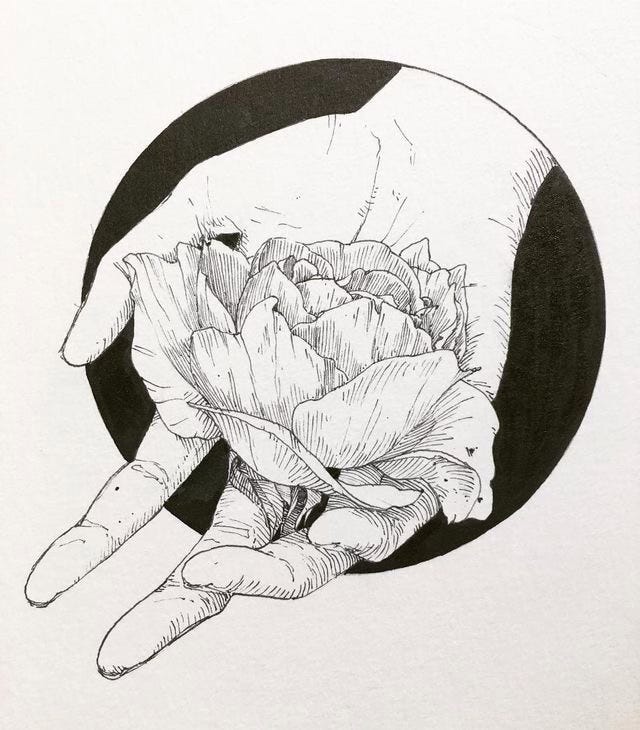Everyone Is A Flawed Person
a story about writing the obvious
A reminder: REASONS FOR LIVING with Esmé Weijun Wang is a newsletter that comes out every other week and is free, featuring a guest essay, poem, piece of visual art, and journal prompt. These things all hang together by theme in a singular edition. On the days when REASONS FOR LIVING is not sharing those things, I share a personal essay that is indeed paywalled.
This is for a number of reasons: some of my personal essays are very personal, and I like the idea of a bit of protection; also, it was promised near the beginning of the year that paying subscribers would receive a paywalled personal essay every other week, and I am trying to keep that promise. Paying members also get to participate in my monthly Fireside Chats, which explore some aspects of creativity and life. This week is a personal essay week.
The one thing that I most recall about Vivian Gornick’s slim volume on writing memoir, The Situation and the Story, is her strong feeling that no person can be portrayed as entirely good or entirely bad. On one hand, this may seem like an obvious point, especially for those of us who also write fiction; people are multi-dimensional, and that includes us, the writers.
On the other hand, some people in my life arise in memory as truly awful and of having perpetrated great harm to myself and others. When I wrote “John Doe, Psychosis,” published in The Collected Schizophrenias, I was aware that writing about the ex-boyfriend I called John Doe would require that I attempt to do what Vivian Gornick exhorted for me to do—this rapist, this abuser, this man arrested and charged with a felony for the possession of child pornography and attempted sex with a minor—I would need to see him as a person again. Most of the time, a sexual predator of children immediately slams down an iron curtain that crowds out anything that could be seen as good. My best friend, for example, sees him as purely evil and wishes that he would die. But as I wrote “John Doe, Psychosis,” I kept thinking about my duties as a writer to humanize him—whatever that meant.
Because I was writing the essay, which John Doe had no input in. He didn’t even know I was writing it. The power of being the one who tells the story is significant. Not only did I have to get the narrative right, or as right as I could be, without having detailed notes from over twenty years ago, but I had to recall his humanity as well. I’d fallen in love with him once, after all, but even back then, I knew that he was lacking in not only kindness but goodness. For the first week that I knew him (he was a friend of M, the boy I was dating), he’d say “Fuck you” to me and nothing else.
“I don’t understand,” I told M. “He doesn’t even know me. Why is he so upset with me?”
“Oh, that’s just how he is,” M said, and John Doe didn’t change his behavior until M unceremoniously dumped me, stating that he “woke up and didn’t feel the same anymore.”
Without getting into the details of my relationship with John Doe, I’ll just say that he was very good at reading me, and I’m certain that he knew how to best lay his trap. While I sat alone, smoking cloves by the art gallery on campus, he came to sit with me.
“I’m sorry M broke up with you,” he said and pulled out his own smoking accouterments—of course, a boy like that would roll his own cigarettes. “I would never do something like that to you.” He added, “But you know, no one will ever understand you the way that I do.”
It was a simple thing to say, but for a lonely sixteen-year-old girl who only wanted to be understood, I was immediately ready to do his bidding. And I did do anything that he wanted, for the most part, no matter what kind of physical, mental, or psychic injury it caused me. I wanted him to love me; I knew that he did not love me. He was playing with me, using me when he wanted me, and discarding me when he had something better. I told my friends that I was a can of tuna fish: he’d eat it when he was hungry, and it was lying around, but when he was truly salivating and hankering, what he dreamt of was a porterhouse steak. So he came around again and again, and I fell harder and harder for him.




